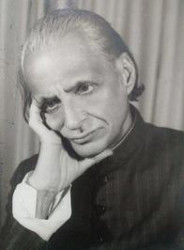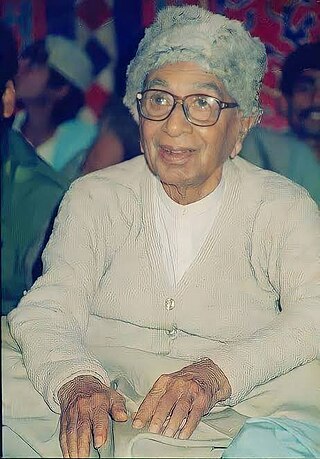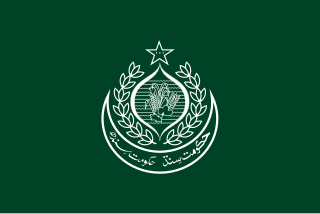
Sindh is a province of Pakistan. Located in the southeastern region of the country, Sindh is the third-largest province of Pakistan by land area and the second-largest province by population after Punjab. It is bordered by the Pakistani provinces of Balochistan to the west and north-west and Punjab to the north. It shares an International border with the Indian states of Gujarat and Rajasthan to the east; it is also bounded by the Arabian Sea to the south. Sindh's landscape consists mostly of alluvial plains flanking the Indus River, the Thar Desert in the eastern portion of the province along the international border with India, and the Kirthar Mountains in the western portion of the province.

Sindhi is an Indo-Aryan language spoken by about 30 million people in the Pakistani province of Sindh, where it has official status. It is also spoken by a further 1.7 million people in India, where it is a scheduled language, without any state-level official status. The main writing system is the Perso-Arabic script, which accounts for the majority of the Sindhi literature and is the only one currently used in Pakistan. In India, both the Perso-Arabic script and Devanagari are used.

Sindhis are an Indo-Aryan ethnolinguistic group who speak the Sindhi language and are native to the Sindh province of Pakistan. The historical homeland of Sindhis is bordered by the southeastern part of Balochistan, the Bahawalpur region of Punjab and the Kutch region of Gujarat. Having been isolated throughout history unlike its neighbours, Sindhi culture has preserved its own uniqueness.

Larkana is a city located in the Sind province of Pakistan. It is the 15th largest city of Pakistan by population. It is home to the Indus Valley civilization site Mohenjo-daro. The historic Indus River flows in east and south of the city.

Ataullah Mengal was a Pakistani politician and feudal figure. He was the head of the Mengal tribe until he nominated one of his grandsons, Sardar Asad Ullah Mengal, as his tribal successor. He was also the 1st Chief Minister of Balochistan during Zulfikar Ali Bhutto's premiership from 1 May 1972 to 13 February 1973. He died on 2 September 2021 in Karachi.
Shah Nawaz Bhutto, was a politician and a member of Bhutto family hailing from Larkana in the Sind region of the Bombay Presidency of British India, which is now Sindh, Pakistan.

Rais Amrohvi, whose real name was Syed Muhammad Mehdi (1914-1988) was a Pakistani scholar, Urdu poet, paranormal investigator, and psychoanalyst and elder brother of Jaun Elia. He was known for his style of qatanigari. He wrote quatrains for Pakistani newspaper Jang for several decade. He promoted the Urdu language and supported the Urdu-speaking people of Pakistan. His family is regarded as family of poets.
Events from the year 1972 in Pakistan.
Mumtaz Ali Khan Bhutto, was a Pakistani politician who served as 8th Governor of Sindh and later the 13th Chief Minister of Sindh. He was also the first cousin of late Zulfiqar Ali Bhutto, who was the Prime Minister of Pakistan from 1973 to 1977.

Sindh National Front (S.N.F.) was a political party active in the province of Sindh, Pakistan. It was led by Mumtaz Bhutto, the cousin of Mr. Zulfiqar Ali Bhutto, ex-Prime Minister of Pakistan, who was hanged by President Muhammad Zia-ul-Haq. In 2017, the party merged with Pakistan Tehreek-e-Insaf.

The Sindhudesh Movement is a separatist movement seeking to create a homeland for Sindhis proposed by Sindhi nationalist parties for the creation of a Sindhi state, which would be either autonomous within Pakistan or independent from it. The movement is based in the Sindh region of Pakistan and was conceived by the Sindhi political leader G. M. Syed after the independence of Bangladesh. He gave a new direction to Sindhi nationalism, founded the Jeay Sindh Tehreek in 1972 and presented the idea of Sindhudesh. Sindhi nationalists sometimes claims the Kutch region of India, the Lasbela District of Balochistan, and sometimes southern Punjab
The Zardari family is a Pakistani political family which currently holds the chieftaincy of the Sindhi-Baloch Zardari tribe. It owns thousands of acres of land in the Sakrand Taluka, Shaheed Benazirabad District, Sindh, especially in the Fatohal Zardari and Balu Ja Quba villages. The family heads the Zardari tribe, which is a Sindhi-Baloch.

Institute of Sindhology is one of the major resources on the history of Sindh. It was the first research institution of its kind, and brought Sindhology to the forefront of international research. Sindhology refers to knowledge about Sindh. The history and culture of Sindh has been shaped by the Indus River. This lifeline of Sindh brings minerals and soil from the Himalayas to the region, then flows into the Arabian Sea at the Indus River Delta located in Sindh. These factors define the scope of Sindhology: the study of antiquities, the relics, the history, and the culture both of ancient and modern Sindh, with particular reference to Sindhi society and literature. The institute provides a repository of this knowledge in the form of a research-oriented center of learning.

Ghulam Murtaza Syed, known as G. M. Syed was a prominent Sindhi politician, who is known for his scholarly work, passing only constitutional resolution in favor of the establishment of Pakistan from British India's Sindh Assembly in 1943. Later proposing ideological groundwork for separate Sindhi identity and laying the foundations of Sindhudesh movement. He is regarded as one of the founding fathers of modern Sindhi nationalism.

The Muhajir people are Muslim immigrants of various ethnic groups and regional origins, and their descendants, who migrated from various regions of India after the Partition of India to settle in the newly independent state of Pakistan. The term "Muhajirs" refers to those Muslim migrants from India, who settled in urban Sindh. The Muhajir community also includes stranded Pakistanis in Bangladesh who migrated to Pakistan after 1971 following the secession of East Pakistan in the Bangladesh Liberation War.

The Politics of Karachi takes place at the municipal, provincial and federal levels of the government. Karachi is a multiethnic, multilingual, multicultural and multireligious metropolitan city. The demographics of Karachi are important as most politics in Karachi is driven by ethnic politics.

Chief Minister of Sindh, is the elected head of government of Sindh. Syed Murad Ali Shah is a PPP politician and the current Chief Minister of Sindh.
Save Urdu Movement is a movement found in both India and Pakistan. In India, it is represented by the statewide units in different states of that country. In Pakistan, the movement is dedicated to ensure that Urdu is protected in Pakistan as its national language. It has especially argued for safeguarding Urdu education in schools.
1972 Language violence in Sindh occurred starting on 7 July 1972 when the Sindh Assembly passed The Sindhi Teaching, Promotion and Use of Sindhi Language Bill, 1972 which established Sindhi language as the sole official language of the province resulting in language violence in Sindh.
The Sindh Mohajir Punjabi Pathan Muttahida Mahaz was a political party in the Pakistani province Sindh. The party was founded in 1969. Nawab Muzaffar Khan was the convenor of MPPM. In theory the party sought to serve as a political platform for Muhajirs, Pashtuns and Punjabis in Sindh, but in reality it functioned as a Muhajir political party as the Pashtun and Punjabi presence in the MPPM ranks was very limited. The party mobilized Urdu-speaking Muhajirs against the emerging Sindhi nationalist movement. It was led by Muhajir bureaucrats and businessmen. The main base of the MPPM was the city of Hyderabad.












